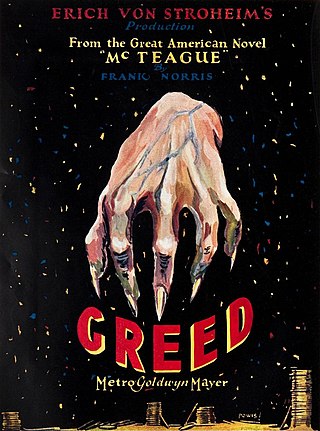
Greed is a 1924 American silent psychological drama film written and directed by Erich von Stroheim and based on the 1899 Frank Norris novel McTeague. It stars Gibson Gowland as Dr. John McTeague; ZaSu Pitts as Trina Sieppe, his wife; and Jean Hersholt as McTeague's friend and eventual enemy Marcus Schouler. The film tells the story of McTeague, a San Francisco dentist, who marries his best friend Schouler's girlfriend Trina.

Scarlet Street is a 1945 American film noir directed by Fritz Lang. The screenplay concerns two criminals who take advantage of a middle-aged painter in order to steal his artwork. The film is based on the French novel La Chienne by Georges de La Fouchardière, which had been previously dramatized on stage by André Mouëzy-Éon, and cinematically as La Chienne (1931) by director Jean Renoir.

Erich Oswald Hans Carl Maria von Stroheim was an Austrian-American director, screenwriter, actor, and producer, most noted as a film star and avant-garde, visionary director of the silent era. His 1924 film Greed is considered one of the finest and most important films ever made. After clashes with Hollywood studio bosses over budget and workers' rights problems, Stroheim found it difficult to find work as a director and subsequently became a well-respected character actor, particularly in French cinema.

Queen Kelly is an American silent film produced in 1928–29 and released by United Artists. The film was directed by Erich von Stroheim, starred Gloria Swanson, in the title role, Walter Byron as her lover, and Seena Owen. The film was produced by Joseph P. Kennedy, who was Swanson's lover at the time.

Mary Elizabeth Hughes was an American film, television, and stage actress best known for her roles in B movies.

The Mask of Diijon is a 1946 American black-and-white horror noir suspense film released from PRC Studios, directed by Lew Landers and featuring Erich von Stroheim, Jeanne Bates and William Wright.
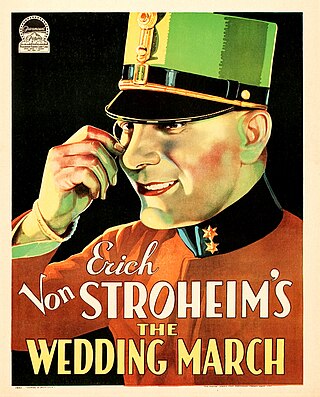
The Wedding March is a 1928 American synchronized sound romantic drama film written and directed by Erich von Stroheim. While the film has no audible dialog, it was released with a synchronized musical score with sound effects using both the sound-on-disc and sound-on-film process. The film stars Erich von Stroheim, Fay Wray and ZaSu Pitts. Paramount Pictures forced von Stroheim to create two films from the footage, the second being The Honeymoon. The Honeymoon is now considered lost, the only known copy destroyed in a fire in France in 1959.

Souls for Sale is a 1923 American silent comedy drama film written, directed, and produced by Rupert Hughes, based on the novel of the same name by Hughes. The film stars Eleanor Boardman in her first leading role, having won a contract with Goldwyn Pictures through their highly publicized "New Faces of 1922" contest just two years earlier.
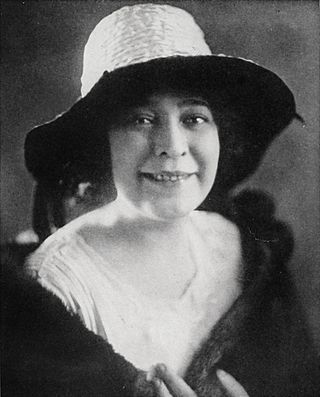
June Mathis was an American screenwriter. Mathis was the first female executive for Metro/MGM and at only 35, she was the highest paid executive in Hollywood. In 1926 she was voted the third most influential woman in Hollywood, behind Mary Pickford and Norma Talmadge. Mathis is best remembered for discovering Rudolph Valentino and writing such films as The Four Horsemen of the Apocalypse (1921), and Blood and Sand (1922).

The Great Gabbo is a 1929 American Pre-Code early sound musical drama film directed by James Cruze, based on Ben Hecht's 1928 short story "The Rival Dummy", and starring Erich von Stroheim and Betty Compson. The film features songs by Lynn Cowan, Paul Titsworth, Donald McNamee and King Zany.

The Lady and the Monster is a 1944 American science fiction horror film directed by George Sherman, and starring Vera Ralston, Richard Arlen, and Erich von Stroheim. The film is about the attempts to keep alive the brain of a multimillionaire after his death, only to create a telepathic monster. The man then takes over the medical assistant's mind, and the "lady" of the title has to fight it. The film's copyright was renewed in 1971, so it will enter the American public domain in 2040.

Alraune, later renamed Unnatural: The Fruit of Evil, is a 1952 West German horror science fiction film, directed by Arthur Maria Rabenalt and starring Hildegard Knef and Erich von Stroheim. The film is based on the 1911 novel Alraune by German novelist Hanns Heinz Ewers. The plot involves a scientist who creates a woman (Knef) who is beautiful yet soulless, lacking any sense of morality.

The Merry Widow is a 1925 American silent romantic drama/black comedy film directed and written by Erich von Stroheim. Released by Metro-Goldwyn-Mayer, the film stars Mae Murray, John Gilbert, Roy D'Arcy, and Tully Marshall, with pre-fame uncredited appearances by Joan Crawford and Clark Gable.

Foolish Wives is a 1922 American erotic silent drama film produced and distributed by Universal Pictures under their Super-Jewel banner and written and directed by Erich von Stroheim. The drama features von Stroheim, Rudolph Christians, Miss DuPont, Maude George, and others.
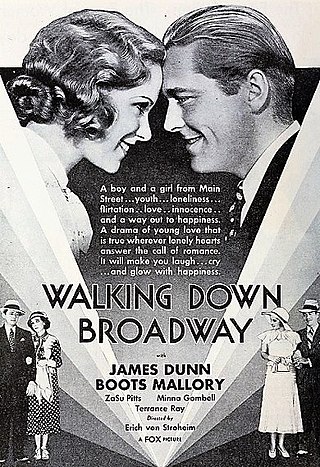
Hello, Sister! is a 1933 American pre-Code drama-romance film produced by Fox Film Corporation. It was directed by Erich von Stroheim, Raoul Walsh, Alfred L. Werker, and Edwin Burke, although none of those directors are credited. The film is a re-edited version of von Stroheim's now-lost film Walking Down Broadway.

Highway Dragnet is a 1954 American film noir B film crime film directed by Nathan Juran from a story by U.S. Andersen and Roger Corman. The film stars Richard Conte, Joan Bennett and Wanda Hendrix. It was Roger Corman's first feature film credit. Corman also worked as an associate producer.

Blind Husbands is a 1919 American drama film written and directed by Erich von Stroheim. The film is an adaptation of the story The Pinnacle by Stroheim.

The Heart of Humanity is a 1918 American silent war propaganda film produced by Universal Pictures and directed by Allen Holubar. The film stars Dorothy Phillips, William Stowell, and Erich von Stroheim.

The Alibi is a 1937 French mystery film directed by Pierre Chenal and starring Erich von Stroheim, Albert Préjean and Jany Holt. It has been described as a precursor to film noir.
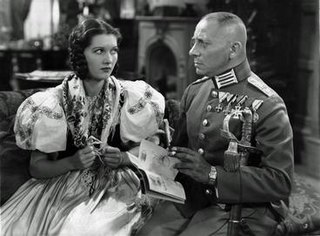
Fugitive Road is a 1934 American comedy drama film directed by Frank R. Strayer and starring Erich von Stroheim, Wera Engels and Leslie Fenton. It is set a border post in Austria following World War I. A variety of different people trying to cross the border end up stranded there, including an American gangster and a naïve young Russian woman hoping to sail to New York to join her brother.





















